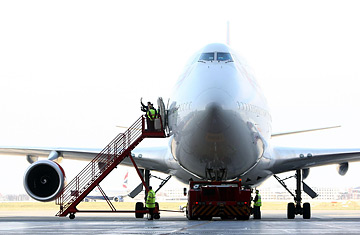燃烧椰子油的飞机,伟大的计划还是商业伎俩?
生物燃料,椰子油
周日上午,维尔京大西洋航空公司波音747专机沿着伦敦希思罗的两条主要跑道之一滑行,起飞到明亮的天空中。但是有不少奇怪的地方,首先,机上只有五人,而100多人从附近的一个机库紧张的观看着。其次,这架飞机是有史以来第一架依赖生物燃料飞行的商业飞机:该燃料由植物物质产生,而非石油或其他化石燃料。 “这是迈向可再生燃料的第一阶段,”维尔京创始人Richard Branson在机库里对记者说道。飞机马上就要起飞了,他的声音不时淹没在头顶飞机的吼叫声中, “这相当于一个婴儿那激动人心的第一步”。

事实上,维尔京的生态飞机只有一个引擎依赖实验性的燃料;其他三个用的是标准喷气燃料。该生物燃料驱动的引擎使用的是常规喷气燃料和生物燃料的混合物: 80/20,正是调控人员赞同的。那么总的来说,其中,仅有49000磅(22,000千克)载油量的5 %算是新颖的所在:一种椰子油和巴西babassu植物油的特殊混合物,它是由总部设在西雅图的帝国可再生能源公司在过去的18个月里研制的,并由俄亥俄州的通用电气航空公司测试过。
即使环保集团全部笑称这次飞行只是一种宣传伎俩,维尔京和其合作伙伴强调,比例不是重点,事实在于,企业的声明,仅仅意味着一种示范。 “我们今天想要证明的是生物燃料可用于飞机,”Branson告诉记者, “两年前,人们以为这是绝对不可能的”。他们担心的是:生物燃料可能在飞机达到巡航高度之前冻结,或可能需要很多昂贵的改变来使飞机或加油系统工作。这些预言被证明是错误的。维尔京周日用的燃油不需要对设备做任何改装;飞机飞到25000英尺(7600米),没有发生任何状况;而且对环境的益处似乎相当清楚,至少燃料是一次装上了飞机。公司内部的测试表明,生物燃料燃烧时只会释放出常规喷气燃料的一半的排放量。
还没有计划可以让商业机群依赖于椰子运行。事实上,生物燃料生产商基本都经历艰苦的数年。由于世界范围的食品价格的飙升,人们越来越担心,生物燃料生产会驱动主食价格的上涨。例如,成千上万的墨西哥人在2006年1月游行,以抗议玉米价格上涨,因美国将它用于生产乙醇。维尔京和合作伙伴声称,他们飞机上的燃料,用Branson的话,“完全符合环境和社会可持续发展”。它不是取自主食作物或需毁林才能得到的作物。但即使是椰子和babassu仍然有问题:油产量没有那么高。如果747要单靠椰子油运行,它将仍然需要十多个英亩的作物来填补一架飞机。
由此一来, Branson和帝国可再生能源公司首席执行官John Plaza说,生物燃料生产商更感兴趣的麻风树,它是可以在拉丁美洲和非洲的非农业用地良好生长的一种带刺的植物。他们也有兴趣于农业藻类,它被Branson称为“未来的喷气燃料”。发展这些原料看似乐观,但商业的大规模生产仍要经过多年,而且获得监管部门对此新喷气燃油的批准可能也需要数年。因此,如果生物燃料一旦被启用在航空业,可能要经过十年才会对工业界所排放的废气有显著的影响。
那是值得努力的吗?一些批评者——像周一破坏希思罗安全保障以抗议机场提出的第三条跑道的绿色和平组织积极分子,辩称减少飞行将更有意义。其他人认为建设更有效率的飞机就会有更大,更现实的环境收益。波音787客机,一旦最后运出到它的买家,将比同类规模的飞机减少20%油耗,几个月后它将用于商业用途。作为航空可持续性的优先选择,“现在‘生物燃料’将非常低,”维尔京大西洋航空公司总裁兼首席执行官Steve Ridgway告诉泰晤士杂志。但担心油尽的时日已经屈指可数,企业须尝试以分散原材料长期维持下去才是有意义的。而且如果对航班的需求继续增长,停止全部的工业排放绝非易事。“我们不是Luddites,我们不可能让时光倒流,”Ridgway说。
There were a couple of strange things about the Virgin Atlantic Boeing 747 that taxied out along one of London Heathrow's two main runways and took off into the bright sky late Sunday morning. First, there were only five people on board, while more than 100 watched intently from a nearby hangar. Second, the plane was the first commercial jet ever to fly on biofuel: a fuel produced from plant matter instead of petroleum or other fossil fuels. "This is the first stage on a journey towards renewable fuel," Virgin founder Richard Branson told reporters in the hangar shortly before take-off, his voice drowned out every now and then by the roar of overhead planes. "It's the equivalent of those exciting first few steps of a baby."
As it happens, Virgin's eco-plane ran only one engine on the experimental fuel; the other three burned standard jet fuel. And the biofuel-powered engine was using a blend of conventional jet fuel and biofuel: 80/20 in favor of the regular stuff. In total, then, just 5% of the 49,000-lb (22,000 kg) fuel load consisted of the novelty: a special mix of coconut oil and oil from the Brazilian babassu plant, prepared by Seattle-based Imperium Renewables over the last 18 months and tested by General Electric Aviation in Ohio.
Still, there are no plans to make commercial air fleets run on coconuts. In fact, biofuel producers in general have had a tough couple of years. As food prices soar worldwide, people are growing ever more worried that biofuel production can drive up the prices of staple foods. Tens of thousands of Mexicans marched in January 2006, for example, to protest the rising price of corn, used in the U.S. to make ethanol. Virgin and partners claim that their airplane fuel is, as Branson says, "completely environmentally and socially sustainable." It's not made from staple-food crops or from crops that required deforestation. But even coconuts and babassu have their problems: the oil yield is just not that high. If a 747 could run on coconut oil alone, it would still take more than a dozen acres of crop to fill one plane.
Down the line, say Branson and Imperium Renewables CEO John Plaza, biofuel producers are more interested in jatropha, a thorny plant that grows well on non-agricultural land in Latin America and Africa. They're also interested in farming algae, which Branson calls "the jet fuel of the future." Development of those feedstocks does look promising, but commercial mass production is still years off. And getting regulatory approval for the new jet fuel could take several years as well. So if biofuel ever takes off in aviation, it will likely be a decade before it has any noticeable impact on industry emissions.
Is it worth the effort? Some critics — like Greenpeace activists who breached Heathrow security Monday to protest the airport's proposed third runway — argue it makes more sense simply to fly less. Others argue there are bigger, more realistic environmental gains to be made by building more efficient airplanes. Boeing's 787 Dreamliner, once it's finally shipped out to its buyers, is expected to burn 20% less fuel than similar-sized planes — and that plane will be in commercial use in just a few months. As priorities go in aviation sustainability, "Right now [biofuel] will be very low," Virgin Atlantic CEO Steve Ridgway tells TIME. But with fears that the days of oil are numbered, it only makes sense that a business would try to diversify its raw materials in the long term. And cutting overall industry emissions will be no easy task if demand for flights continues to grow. "We cannot be Luddites and turn the clock back," Ridgway says.
Just before 12:30 at Heathrow, Virgin Atlantic's 747 touched down in Amsterdam, finishing off the event without a hiccup — which is more than could be said for Branson himself. For kicks, the mogul had drunk a sample of his firm's coconut oil and babassu oil jet-fuel blend. "My God that was horrible," he told reporters afterward. "I've been burping ever since." Now that, without a doubt, is a publicity stunt.






